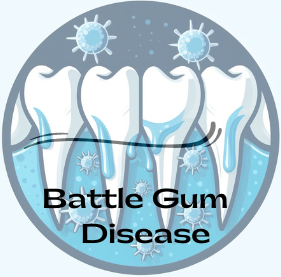Gum disease isn’t just about bleeding gums and bad breath. It goes much deeper, affecting the tissues and bones that support your teeth. Most folks refer to it as gingivitis in its early stages, which, if not addressed, may progress to periodontitis. Knowing this progression can really make a difference.
Spotting gum disease early can save a whole lot of trouble down the road. Look out for symptoms like swollen or tender gums, bleeding while brushing or flossing, receding gums, and persistent bad breath. If you’re nodding along and thinking you’ve got those signs, it might be time to see your dentist.
Ignoring gum disease is a risky game. Without intervention, it can lead to tooth loss. Plus, gum disease is linked to other health issues, like heart disease and diabetes. Taking care of your gums is part of taking care of your overall health.
Keeping your mouth healthy goes beyond just brushing your teeth. Flossing, regular dental check-ups, and a balanced diet all play a part. Oral health is a big deal, and it deserves your attention.

Dentures and Gum Disease: Are They a Good Match?
Getting dentures when you have gum disease is a bit of a mixed bag. It’s not just a matter of popping in a new set of man-made teeth and calling it a day. The state of your gums plays a big role in whether dentures will work well for you.
Healthy gums are crucial because they help support your dentures. When gum disease is present, it can lead to issues with fit and comfort. If the tissue is inflamed and damaged, it makes it harder for dentures to sit properly, causing irritation and possibly more damage.
Talking to your dentist should be your first step. They’ll give you some advice on whether dentures are a viable option for you. Dentists can assess how gum disease affects your oral structure and guide you on what to expect if you go ahead with dentures.
There are obstacles to having dentures with gum disease. Loose-fitting dentures are just one. Constant movement can aggravate the gums. So, managing gum health is key to making dentures bearable. Solutions must be personalized since everyone’s mouth is unique.
Options for Individuals with Gum Disease Considering Dentures
When thinking about dentures while dealing with gum disease, a one-size-fits-all approach definitely doesn’t work. Before jumping to dentures, consider some other dental solutions available that might better suit your situation.
Weighing the pros and cons of dentures in the context of gum issues is crucial. While dentures provide a cosmetic solution, they may not address all underlying health problems. Being informed about the potential negatives helps in making a balanced decision.
Advancements in dental technology are a saving grace here. Implants and gum-tissue regeneration techniques can sometimes offer alternatives that preserve natural teeth longer. These alternatives tend to support gum health more effectively than conventional dentures.
Permanent dentures might seem like an end goal, but temporary solutions are worth considering, especially in the early stages of gum disease treatment. Temporary dentures give your gums a chance to heal, and you can switch to something more permanent down the line once your gum health stabilizes.
Caring for Dentures: Ensuring Longevity and Comfort
Once you’ve got dentures, keeping them in great shape is your next move. Proper care is crucial for comfort and the lifespan of your dentures.
Regular cleaning is a must. Just like natural teeth, dentures need daily cleaning to remove food particles and plaque. Look for a soft toothbrush and some mild detergent or denture cleaner that suits you.
Adjustments are part of the journey with dentures. Initially, they can feel awkward, and minor changes might be needed to get that perfect fit. Don’t shy away from visiting your dentist to tweak the fit and avoid sore spots.
Your lifestyle also plays a role. Eating a balanced diet not only helps with overall health but can make adapting to dentures much smoother. Chewing certain foods may feel different, so take it slow and give yourself time to adjust to the dentures.
Regular check-ups with your dentist ensure that everything stays in line. If you’re using dentures while managing gum disease, these visits are even more important to monitor any changes in gum health or denture fit.
Improving Oral Health: Preventing Further Gum Disease
Consistent oral care is your friend when it comes to keeping gum disease at bay.
- Brushing twice a day with fluoride toothpaste, along with regular flossing, can significantly curb the risk of gum complications.
- Diet plays a surprisingly big role too. Foods rich in vitamins, especially C and D, promote healthy gums. Cutting down on sugar helps, as sugar fosters bacterial growth leading to plaque and tartar.
- Exploring natural remedies might give you an edge. Oils like coconut and essential blends have properties that can boost oral health. While these aren’t replacements for brushing and flossing, they might offer additional support.
- Professional care is absolutely necessary and shouldn’t be underestimated. Dentists can tackle areas you can’t reach and notice early signs of trouble you might miss. Regular cleanings and check-ups are pivotal for maintaining a healthy mouth, especially when managing dentures alongside gum disease.
Making the Decision: Dentures and Your Oral Health Journey
Choosing dentures amidst gum disease challenges can be a tough call, but staying informed eases the way forward. Armed with the right information and dental advice, your choice aligns better with your health needs.
Dentures aren’t just about the look; they’re about approximating full-mouth function and aiding speech clarity. Knowing your priorities and what you need from dentures will guide you toward the best kind that’s fit for your situation.
Remember, your dentist is your partner, offering insights and adjustments as needed. The right support makes a huge difference.
Whether you’re weighing temporary dental fixes or committing to a permanent solution, maintaining your gum health should always remain front and center. A healthy foundation supports whatever choice you make for teeth replacement.
Staying proactive with oral care and seeking professional help when required keeps things in balance. Your efforts today contribute significantly to long-term dental comfort and health, whether you’re wearing dentures or holding on to your natural teeth.
